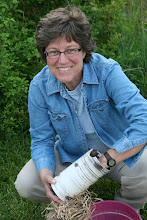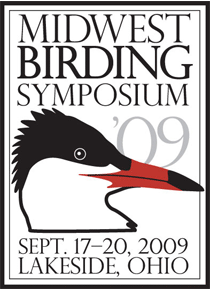Box Turtle Mysteries
Well, the wait is over. Early last June, I found a female box turtle laying eggs in our meadow. I left her alone, marked the spot with a Kleenex, and returned first thing in the morning to cage the nest, to protect it from digging mammals, egg-loving snakes, and crows. I put a fine-mesh cage over the nest proper, with 1/2" hardware cloth, and a large iron milk crate over that. I drove stakes in to firmly anchor the outer cage, knowing the strength and determination of raccoons. Last summer, I found three box turtle nests along the same path, all of which had been dug out by coons or skunks.
Knowing that box turtle nests need about three months to incubate, I began checking the nest every couple of days in September. Nothing, nothing, nothing. Nothing through October, and then it was too cold for the hatchlings to emerge. A certain percentage of hatchlings emerge in spring. I checked on it all winter, and began checking it this spring on warm days after rains. I worried all winter that my driving the stakes in the day after they were laid might somehow have addled the eggs with vibration.
Today, while working on a painting, I got an overpowering feeling that something had happened at the nest. Chet and I trotted out the meadow, and I peered into the cage. I couldn't tell, with all the overgrowth, whether I was seeing what I thought I was seeing. I yanked the stakes up to find two small exit holes, and a tiny box turtle hatchling, nose down in a shallow scrape in the clay. I was shaking with excitement.
Gently, I pried the little turtle out of the clay. It was so tiny, it could fit on a quarter. Its shell was soft and it was motionless.
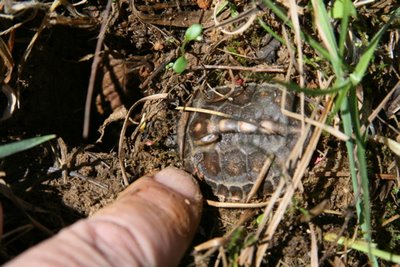 Slowly, it dawned on me that this hatchling was dead. I was crushed. and determined to figure out why. My CSI tendencies kicked in. First, it was clear to me that it had died very recently, perhaps even this morning. There was no odor, and it was stiff with rigor mortis. There was something very wrong with its eyes and beak; they were covered with a pinkish membrane that I cannot remove. It could not have opened its eyes or breathed, except perhaps through its mouth. I thought at first this might be an egg membrane, but it seemed too tough. I still don't know whether this was a birth defect or an unusually tough membrane that adhered to the turtle's face in hatching. More of the pinkish membrane appeared along the sides and top of its shell. Again, it couldn't be peeled off. I began to think that this turtle had a birth defect. How sad.
Slowly, it dawned on me that this hatchling was dead. I was crushed. and determined to figure out why. My CSI tendencies kicked in. First, it was clear to me that it had died very recently, perhaps even this morning. There was no odor, and it was stiff with rigor mortis. There was something very wrong with its eyes and beak; they were covered with a pinkish membrane that I cannot remove. It could not have opened its eyes or breathed, except perhaps through its mouth. I thought at first this might be an egg membrane, but it seemed too tough. I still don't know whether this was a birth defect or an unusually tough membrane that adhered to the turtle's face in hatching. More of the pinkish membrane appeared along the sides and top of its shell. Again, it couldn't be peeled off. I began to think that this turtle had a birth defect. How sad.The yolk sac had been completely absorbed, making me think that this turtle had hatched last fall and slept in the scrape over the winter. Clearly, it had enough energetic resources to dig out (no small feat, given how many roots had infiltrated the chamber). How it did that with its nostrils and eyes covered up I don't know.
Here is a picture of the entire scene. You can see one dark exit hole to the upper left, and the second one is to the right of the turtle, just to the right of the three grass blades.
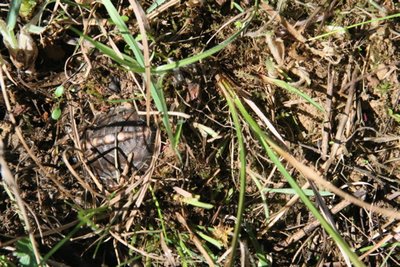
I dug more, very carefully. First, I found an addled/infertile egg that had collapsed, entire. Then, two eggshells that had been hatched out of. One must have belonged to the dead hatchling. The other must have belonged to the turtle that made the second exit hole. But where was that turtle? I searched through the grass for several feet around the nest, finding nothing.
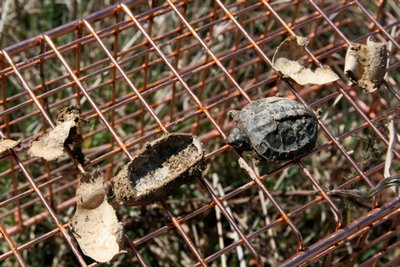
I dug out the entire scrape. No hatchling. I can only think that the second hatchling must have dug laterally until it was out from under the small, inner cage, then exited the large milk crate and set out for parts unknown. It's also possible that it made its way out of the small cage via the larger corner holes. If there even was a second hatchling. But the eggshells and the second exit hole argue strongly that there was.
As is often the case in nature sleuthing, I'm left with more questions than answers. Did I do any good here? Did I cause the death of the unhatched egg, or somehow cause the death of the defective hatchling? Is there one tiny turtle crawling the planet who would have otherwise been lost to predators? I don't know the answers. I can only think about how to do better by them this year, if I get the chance.
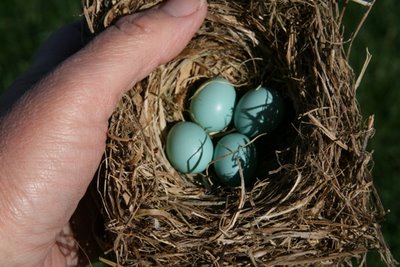
To all those who've been waiting, and especially to Kai, I'm sorry I don't have a happier story for you.
Meanwhile, in the front yard box, life is beginning. Four warm bluebird eggs on March 30, five eggs on March 31; projected hatch date April 12.
Labels: box turtle nest

